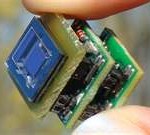One revolutionary concept being pursued by a team of researchers in New Zealand involves creating ‘wearable energy harvesters’ capable of converting movement from humans or found in nature into battery power.
Researchers at the Auckland Bioengineering Institute’s Biomimetics Lab believe that a class of variable capacitor generators known as “dielectric elastomer generators” (DEGs) or soft generators shows great potential for wearable energy harvesting.
DEGs may enable light, soft, form-fitting, silent energy harvesters with excellent mechanical properties that match human muscle. They describe their findings in the American Institute of Physics’ journal Applied Physics Letters.
Dielectric elastomers, often referred to as artificial muscles, are stretchy materials that are capable of producing energy when deformed. In the past, artificial muscle generators required bulky, rigid, and expensive external electronics.
McKay and his colleagues at the Biomimetics Lab are working to create soft dexterous machines that comfortably interface with living creatures and nature in general.
The soft generator is another step toward fully soft devices; it could potentially be unnoticeably incorporated into clothing and harvest electricity from human movement.
When this happens, worrying about the battery powering your cell phone or other portable electronics that need battery replacement will become a thing of the past. This should help keep batteries out of landfills.
“One of the most exciting features of the generator is that it’s so simple; it simply consists of rubber membranes and carbon grease mounted in a frame,” explains Thomas McKay, a Ph.D. candidate working on soft generator research at the Biomimetics Lab. explains.
